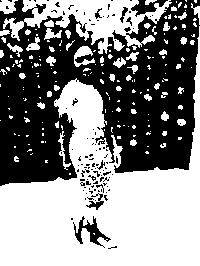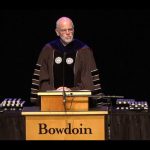
Briana Cardwell ’17 is interning with Boston NAACP four days a week, and at the Big Sister Association and the Massachusetts Immigrant and Refugee Advocacy Coalition one day each
A year of painful racial conflict has reminded us all that the United States still has much work to do to overcome racism.
At least one Bowdoin student has decided to face the issue up close and do what she can to help. This summer, Briana Cardwell ’17 has a grant from Bowdoin to intern for the Boston chapter of the NAACP. She received a Preston Public Internet Career Fund Fellowship, allowing her to work at a nonprofit staffed entirely by volunteers.
The Preston fellowship is part of the Career Planning Office’s funded internship program, which enables students to support themselves during the summer while interning for worthwhile organizations that can’t pay them wages.
Cardwell, who is from Everett, Mass., is assisting a Boston NAACP vice president with a number of duties, including responding to people who stop by or call in with discrimination claims. She has heard stories from people suffering harassment at their jobs and from those who fear they are being discriminated against when trying to obtain housing or stay in their homes. Prisoners also sometimes send letters reporting discrimination, and the NAACP responds by appointing them pro bono lawyers if necessary, or by offering advice.
“If you’re having, for example, a housing problem, my boss will help you figure out the situation, give a lot of advice, appoint a real estate lawyer or help you find a home,” she said. “I sit in on that [meeting] and take notes. I’m learning how to have conversations with people about the issues they have.” Even when the situation turns out not, in fact, to have to do with race — but rather say with poverty or bureaucratic tangles — the NAACP still tries to help, Cardwell added.
While the Boston NAACP is working to end discrimination and racism, and to support people of color, it is not, according to Cardwell, directly involved in the bigger political stories of the day, such as the shooting in the Charleston church or the widely publicized episodes of police brutality. And this, she says, has frustrated a few NAACP constituents and has led to some of her most challenging moments on the job.
“Some of the hardest things I have had to deal with are people yelling because they think the organization isn’t doing anything in response,” she said. Instead, the local NAACP chapter is focused on its home city, Boston, and the people who live there. When a racial event does occur in Boston, such as the recent police killing of a Muslim man, the chapter gets involved.
“It’s more community based,” Cardwell explained. “The goal is to empower the community.” For instance, she has recently begun helping with a workshop for families with kids who are at risk of violence, drugs, dropping out of school. The workshop offers parents skills to deal with tough family situations.
Cardwell says her first month at the NAACP has opened her eyes to the prevalence of racism. While she reports having experienced some racism in her lifetime, she says she has not personally experienced anything close to what she is seeing through her work this summer. “I know America is struggling right now with racial tensions, but I didn’t know it was as much of a problem as it is,” she noted.
Besides working for the NAACP four days a week, Cardwell is also volunteering for the Big Sister Association and for the Massachusetts Immigrant and Refugee Advocacy Coalition. At Big Sister, she is working to recruit more girls of color to volunteer. At MIRA, she is helping new citizens fill out paperwork. This leaves her with just Sundays free.
Cardwell doesn’t mind being busy. “I keep telling myself that this is all for my future, and that I am getting the experience that I need,” she said. An Africana studies major and sociology minor, Cardwell wants to study law after she graduates from Bowdoin and eventually become an immigration and civil rights attorney. She says that after watching her two uncles get deported to Belize (where her father and his family are from), she became determined to help her family and others in the same situation. She entered Bowdoin with this goal in mind.
Once at Bowdoin, she became involved in more civil rights issues. She joined student groups addressing racism and participated in committees with deans to discuss diversity on campus. “I realized this is part of my life, and I need to do this,” she said.
